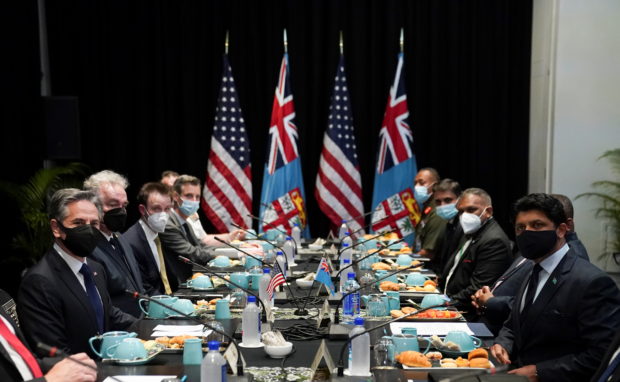White House welcomes Fiji to its Indo-Pacific economic plan

U.S. Secretary of State Antony Blinken meets with Fijian acting Prime Minister Aiyaz Sayed-Khaiyum upon arrival in Nadi, Fiji, February 12, 2022. REUTERS/Kevin Lamarque/POOL
WASHINGTON — Fiji is joining U.S. President Joe Biden’s Indo-Pacific Economic Framework (IPEF), the White House said on Thursday, making it the first Pacific Island country in the plan that is part of a U.S. effort to push back on China’s growing regional influence.
The announcement comes as China’s Foreign Minister Wang Yi begins a sweeping tour of Pacific Island nations – including Fiji – a region that is becoming an increasingly tense front in competition for influence between Beijing and Washington.
Wang arrived in the region this week seeking a 10-country deal with island nations there on security and trade that has unnerved the United States and its Pacific allies.
The White House welcomed Fiji as a founding member of IPEF, which it said now includes countries from Northeast and Southeast Asia, South Asia, Oceania, and the Pacific Islands.
“Across geography, we are united in our commitment to a free, open, and prosperous Indo-Pacific region,” National Security Advisor Jake Sullivan said in a statement, underscoring Fiji’s valuable perspective in the fight against climate change.
With Fiji’s addition, IPEF now represented the full regional diversity of the Indo-Pacific, a senior administration official said.
Biden officially launched IPEF earlier this week during his first trip as president to Asia, which has craved further U.S. economic engagement.
Fiji is the 14th country to join IPEF talks, which exclude China.
Washington has lacked an economic pillar to its Indo-Pacific engagement since former President Donald Trump quit a multinational trans-Pacific trade agreement, in part out of concern over U.S. jobs.
IPEF is unlikely to include binding commitments, and some Asian countries and trade experts have expressed skepticism of the plan.
RELATED STORY:
Biden’s Asian economic talks include 13 countries, and no China